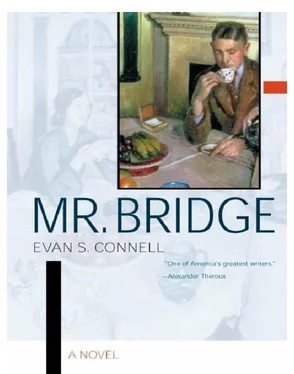Mr. Bridge did not ask any questions about Nevacal. He had never heard of it. He knew it would have no rating with Standard and Poor’s, it would not be listed on the New York exchange, and certainly it paid no dividend. These things being so, and quite apart from his mistrust of the broker, he knew he was not going to drop a single dollar into it. He wondered if Sauer had invested. This was not impossible; in fact, it was possible that not only had Sauer invested in this will-o’-the-wisp, he had invited the broker to spread the gospel.
Some days later he was shocked to learn the effect of Avrum Rheingold’s recommendation: four members of the round table had bought shares of Nevacal. Only Virgil Barron had not; and when they discussed this they agreed that it was, at best, a dangerous speculation. Beyond that it could be a deliberate fraud. Barron knew something about Avrum Rheingold. The broker’s reputation matched his appearance.
That evening Mr. Bridge looked in the paper. As he suspected, the company was unlisted. The next morning he telephoned his brokerage firm to inquire about it. After some delay, during which he was twice asked to spell the name, a quote was obtained. The price had risen to four dollars. He said he did not want to buy any stock, he was merely curious about the price.
A week later he called again. Nevacal was selling for approximately six dollars a share. He hung up the telephone in a bad humor. The price of Nevacal would drop as sharply as it had risen, he was positive of that.
He did not call the brokerage office again, because it would be embarrassing to inquire three times about Nevacal without buying any, but at luncheon when the conversation got around to the stock market he inquired in a jocular tone if anybody knew how Nevacal was doing. Everybody knew. He was the only one at the table who did not know. It was selling for nine dollars. Virgil Barron had reconsidered and bought some.
Mr. Bridge laughed. He advised them to sell out while they were ahead.
Alex Sauer said he was in close touch with Avrum Rheingold. Rheingold believed it would go higher.
“Suit yourselves, but don’t say I didn’t warn you,” Mr. Bridge remarked, and he tapped the table for emphasis.
The following Friday there was an item in the Wall Street Journal . Nevacal had reported a three-hundred percent increase in profit over the previous fiscal year. Management was predicting further gains for the year ahead. The stock, still unlisted, was quoted at eleven dollars a share.
Mr. Bridge knew it would go down. It was due for a severe setback.
But it continued to go up, and finally Avrum Rheingold passed the word. The time had come to sell. Everybody in the group sold out, very well satisfied because they had quadrupled their money, all except Virgil Barron who had jumped aboard after the train was moving.
“You got away with it,” Mr. Bridge addressed them. “More power to you. My personal opinion is that if you keep pulling stunts of this sort you are headed for trouble.”
He had not mentioned Nevacal at home, because it did not concern the family — except that if the shares had dropped in value he meant to cite this as an example of irresponsible investing. Unfortunately Nevacal had done just the opposite, so there was no sense discussing it. To do so would only encourage the children toward similar speculations when they were old enough to take an interest in such things. Instead, as soon as he observed during a brisk market rally that Kansas City Power & Light had scored a fifty-cent advance he pointed this out to the children, reminding them that they should always pay attention to basic values.
He felt no particular obligation to instruct or prepare the girls for their future except to make certain they were neat, polite, truthful, modest, and adequately educated; the rest of the business could be handled by their mother. Once out of school they might work at one job or another while waiting to get married, and if they spent a year or so doing something trivial it would not really be a waste of time. Quite the opposite. Better a couple of years in an office typing letters and running errands than an impulsive marriage ending in divorce. But for Douglas to squander his time at one meaningless task after another would be ridiculous. Accordingly, he planned to speak to his son about the future, to encourage him to start thinking about it, and by delineating not only the rewards but the liabilities of his own career he hoped to provide some suitable points of reference. He wished to impress upon his son three things which he felt that he himself had achieved: financial security, independence, and self-respect. In his mind these were of supreme importance. They stood together like the points of the fleur-de-lis.
In the bedroom in an ordinary black picture frame was a letter appointing Henry Thompson Bridge a colonel in the Army. The letter was dated 1812 and it was signed by James Monroe, who was then Secretary of State. Mr. Bridge could not recall the first time he had seen this letter, which had belonged to his uncle, but he had been fascinated by it as long as he could remember, and his uncle had willed it to him. Now, although the letter had been hanging in the same place in the bedroom for quite a few years, he was still aware of it, and he thought it may have been this document which first caused him to become curious about his ancestry, with the result that he had commissioned a genealogist to do some research. The genealogist eventually brought him a little history of his predecessors, which he had read many times, and considered, and which he had shown to his wife and the children. He was somewhat disappointed that they did not find it as fascinating as he did himself. It was understandable, of course, that his wife would be less interested in his forebears than she would be in her own; he had been thinking of employing the genealogist again to do a similar paper on her family, which might be a nice surprise for her birthday. As for the children, they ought to be interested, and he hoped they would be when they were older. Carolyn did show signs of curiosity, but Ruth and Douglas were singularly unimpressed.
He had told them that in Delaware there was a town named after their great great-grandfather, and that the brother of this man was at one time the lieutenant governor of Ohio. Another ancestor was a Scottish earl who owned a castle which still stood near the village of Auldearn by Moray Firth. What did they think about that! Another ancestor was a major in the Revolutionary War. Another was the fourth president of Hamilton College. Another was recommended to President Hayes for appointment as the American ambassador to Mexico, although for some reason he did not get the appointment.
They listened to all of this with very little comment. Finally Douglas inquired about horse thieves.
Well, Mr. Bridge answered, no doubt the family had its share, because few families have not had their black sheep, but their names were not recorded for posterity. Why? Why was he asking?
No reason. Just asking, Douglas said.
On the lot where the cave used to be there was now a red-brick Colonial house with French windows, with six square white pillars fronting the portico, and a brass lion’s head on the door. The garage, which was a smaller replica of the house except for the pillars, had room for three cars. Throughout the winter, regardless of bad weather, the workmen had been there. Now the house was almost finished.
“I can’t help wondering who’ll move in,” Mrs. Bridge said. “Nobody seems to know.”
“Whoever they are, they’ve got money,” he said. “Great Lord, the amount that place must have cost!”
Читать дальше












